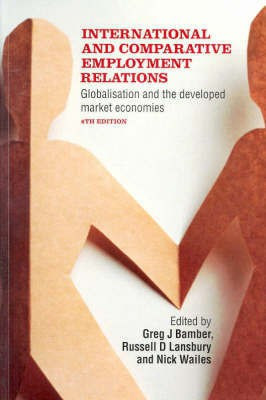International and Comparative Employment Relations(English, Paperback, Bamber Greg J)
Quick Overview
Product Price Comparison
This highly readable book is an invaluable resource for students, practitioners and policymakers as they confront the challenges of globalisation and of the information age.' Professor Janice Bellace, The Wharton School, University of Pennsylvania, USA The employment relations of any one country can no longer be studied in isolation, and this splendid book is the best available means of placing national institutions and practices in an international perspective.' Professor William Brown, Department of Applied Economics, University of Cambridge, UK Teachers and students will welcome the new edition of this established text whose integrated approach assists the understanding of national employment contexts as a basis for furthering the theoretical development of international and comparative industrial relations.' Professor Linda Dickens, Warwick Business School, University of Warwick, UK The fourth edition of International and Comparative Employment Relations continues to set the standards for learning about this subject.' Professor Thomas A. Kochan, Sloan School of Management, Massachusetts Institute of Technology, USA How is globalisation impacting on employment relations?What is the context for Human Resource Management in other countries? What can we learn from the experiences of other countries? Earlier editions of this book have become the standard reference for a worldwide readership of practitioners in governments, companies and unions, and students. This completely revised new edition systematically analyses employment relations in the UK, USA, Canada, Australia, Italy, France, Germany, Sweden, Japan and Korea. The introduction and conclusion examine the relevant theories and latest trends while an appendix provides valuable comparative data. Experts examine the environment of employment relations in each country: economic, historical, legal, social and political. They outline the major players' and evaluate such processes as arbitration, consultation and employee participation. They also discuss non-unionised workplaces, novel forms of HRM, law reform, multinational enterprises, differences between eastern and western companies, small and medium sized enterprises, technological change, flexibility and pay determination.


